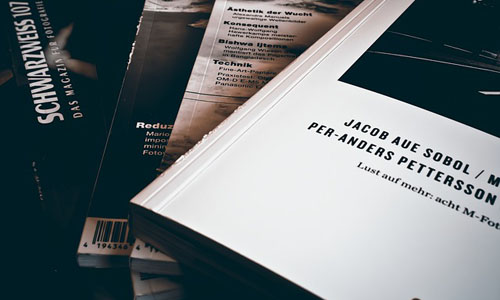Servicio de traducción de revistas
En el mundo académico globalizado de hoy, la traducción de artículos de investigación se ha vuelto esencial para los investigadores y académicos que buscan compartir sus hallazgos a nivel internacional. A medida que más revistas exigen presentaciones en inglés u otros idiomas importantes, la capacidad de traducir con precisión los artículos de investigación es fundamental para garantizar que no se pierda conocimiento valioso. Reconociendo estos desafíos, hemos desarrollado un servicio que cierra la brecha lingüística al tiempo que respeta las complejidades de cada área temática. Nuestros traductores expertos, con sólida formación académica, garantizan que su investigación se comunique de manera clara y eficaz, manteniendo su intención original y el rigor académico. También ofrecemos asistencia lingüística integral, que incluye edición y corrección, para garantizar que su artículo esté listo para su publicación en cualquier idioma de destino.

Por qué elegirnos
El mejor traductor de revistas

1. Escenario de demanda
La traducción de publicaciones periódicas es fundamental para investigadores, académicos y profesionales que desean difundir sus hallazgos a un público global. A continuación, se indican algunos escenarios de demanda clave en los que los servicios de traducción de publicaciones periódicas son esenciales:
- Investigación académica y colaboración global: Las universidades y las instituciones de investigación suelen publicar estudios en revistas especializadas. La traducción de estos artículos a varios idiomas permite una colaboración internacional más amplia y un intercambio de conocimientos. Los investigadores de países de habla no inglesa, en particular, se benefician del acceso a investigaciones de vanguardia en sus idiomas nativos, lo que promueve la inclusión en el discurso científico.
más
- Publicación en revistas internacionales: los académicos que deseen publicar en revistas internacionales de alto impacto pueden necesitar que sus artículos se traduzcan al inglés o a otros idiomas de amplia difusión. Una traducción precisa garantiza que se conserven el significado y los matices originales de la investigación, lo que aumenta las posibilidades de publicación y reconocimiento en la comunidad académica mundial.
- Estudios transfronterizos sobre políticas y desarrollo: las publicaciones que se centran en el análisis de políticas, los estudios de desarrollo o las relaciones internacionales suelen tener lectores de todo el mundo. La traducción de estas publicaciones garantiza que las opiniones críticas y las recomendaciones sobre políticas lleguen a las partes interesadas, los responsables de las políticas y las instituciones de diferentes regiones, lo que fomenta una mejor comprensión y cooperación.
- Revistas técnicas y médicas: en campos como la medicina, la ingeniería y la tecnología, las revistas contienen contenido altamente especializado. Traducir estos artículos requiere no solo conocimientos lingüísticos, sino también un profundo conocimiento del tema en cuestión para mantener la precisión y la credibilidad. Esta demanda es particularmente fuerte en regiones con capacidades de investigación emergentes.
- Comunicación multilingüe para eventos globales: las conferencias y los simposios suelen dar lugar a la publicación de actas y números especiales de revistas. La traducción de estos documentos a varios idiomas ayuda a ampliar el alcance de los resultados del evento, lo que facilita el diálogo y la colaboración permanentes entre los participantes internacionales.
Estos escenarios ilustran la importancia de la traducción de revistas para superar las barreras lingüísticas y permitir el intercambio global de conocimientos entre disciplinas.
2. Requisitos de calificación
Estos son los requisitos de calificación clave para proporcionar servicios de traducción de revistas:
- Habilidades lingüísticas avanzadas: los traductores deben tener un dominio casi nativo tanto del idioma de origen como del de destino. Esto garantiza que el texto traducido mantenga los mismos matices, el mismo tono y el mismo significado que el original.
- Conocimientos especializados: Los traductores deben tener una sólida formación en el campo específico de la revista, ya sea medicina, ingeniería, ciencias sociales o cualquier otra disciplina. Esta experiencia les permite comprender y traducir con precisión términos y conceptos técnicos complejos.
más
- Trayectoria comprobada: Es fundamental contar con experiencia en la traducción exitosa de artículos de revistas o trabajos académicos. Esta experiencia demuestra la capacidad del traductor para manejar las rigurosas demandas de la traducción académica, incluido el mantenimiento de la integridad de los datos, las metodologías de investigación y las citas.
- Precisión en la terminología: Los traductores deben ser meticulosos en el uso de terminologías correctas, especialmente en campos altamente especializados. Cualquier desviación puede alterar el significado y afectar la credibilidad de la investigación.
- Revisión por pares o revisión de un segundo traductor: la traducción de una revista de alta calidad a menudo implica que un segundo traductor o editor revise el trabajo y garantice que la traducción sea precisa y esté libre de errores.
- Confidencialidad: Los traductores deben cumplir estrictos acuerdos de confidencialidad, especialmente cuando tratan con investigaciones no publicadas o datos confidenciales.
Estos requisitos de calificación garantizan que las traducciones de revistas cumplan con los altos estándares esperados en la comunidad académica, contribuyendo a la difusión precisa del conocimiento en todos los idiomas y culturas.


3.Varios tipos
La traducción de revistas se puede clasificar en varios tipos según el propósito, el contenido y el público al que se dirige. Estos son los principales tipos de traducción de revistas:
- Artículos de investigación: traducción de trabajos de investigación originales que presentan nuevos hallazgos, metodologías o teorías en campos académicos específicos. Este tipo de traducción requiere un profundo conocimiento del tema para transmitir con precisión ideas complejas.
- Revistas de ingeniería y tecnología: traducción de artículos relacionados con avances en ingeniería, TI y tecnología. La traducción requiere familiaridad con la terminología y los estándares específicos de la industria.
más
- Traducción de manuscritos para su envío: traducir manuscritos antes de enviarlos a revistas internacionales. Esto implica no solo traducir el contenido, sino también adaptarlo para cumplir con los requisitos de estilo y formato de la revista de destino.
- Revistas jurídicas: traducción de artículos sobre teoría jurídica, análisis de jurisprudencia o revisiones legislativas. La precisión jurídica es fundamental para evitar malas interpretaciones.
- Revistas bilingües o multilingües: traducción de contenidos para revistas que se publican en varios idiomas. La coherencia entre las distintas versiones lingüísticas es fundamental y los traductores deben colaborar para garantizar la uniformidad en la terminología y el estilo.
- Traducción de resúmenes: Traducir resúmenes de artículos, que a menudo determinan si un artículo atraerá la atención de los lectores o si será seleccionado para leer más. El resumen debe ser conciso pero completo.
- Localización para audiencias regionales: adaptación de artículos de revistas para que se ajusten al contexto cultural y regional de la audiencia de destino. Esto puede incluir el ajuste de referencias, ejemplos y terminologías para que el contenido sea más accesible y relevante.
Cada tipo de traducción de una revista tiene un propósito distinto y requiere habilidades y conocimientos específicos para garantizar que el contenido siga siendo preciso, creíble e impactante en diferentes idiomas y culturas.
Traducción de revistas en 3 sencillos pasos
4.Equipamiento técnico
La empresa cuenta con más de 2000 traductores profesionales, tanto a tiempo completo como a tiempo parcial, y ofrece soporte para más de 20 idiomas con sistemas operativos Windows. Utilizamos los sistemas de memoria de traducción más avanzados del mundo, incluidos TRADOS y SDLX, y estamos equipados con computadoras de alto rendimiento, escáneres, impresoras, grabadoras de CD, cámaras digitales, acceso de banda ancha y una red interna. Dominamos varios programas de oficina y producción, como Office, Photoshop, Freehand, Framemaker, Pagemaker, InDesign, QuarkXpress, Illustrator, Acrobat, CorelDraw, MS Word y PowerPoint.
más
Podemos manejar de manera eficaz una variedad de archivos fuente, utilizando fuentes proporcionadas por Framemaker, Pagemaker, Quark, InDesign, Illustrator, Photoshop o MS Word. Nuestras ofertas incluyen 23 fuentes Unicode diferentes que rompen las barreras del idioma en todo el mundo, fuentes GB18030 que se adhieren a los últimos estándares nacionales de codificación chinos, fuentes Hong Kong HKSCS=2001, así como fuentes Big5 tradicionales y simplificadas para chino. Podemos satisfacer los requisitos de fuentes de diferentes clientes y atender diversas necesidades de publicación. Desde la traducción hasta la impresión, nuestros servicios integrales de preimpresión preservan el estilo del documento original y ahorran tiempo a los clientes al personalizar el proceso de diseño para satisfacer necesidades específicas.


5. Principios de traducción
A continuación se presentan los principios de traducción clave específicos para la traducción de revistas:
- Fidelidad al texto original: la traducción debe reflejar con precisión el contenido, el significado y la intención del texto original. Esto incluye la conservación de los matices del lenguaje, los detalles técnicos y la terminología específica utilizada en el material original.
- Legibilidad: la traducción debe ser clara y fácil de entender para el público de destino. Esto implica estructurar oraciones y párrafos de manera que fluyan naturalmente en el idioma de destino, evitando frases demasiado complejas o enrevesadas.
más
- Terminología uniforme: la coherencia en el uso de los términos a lo largo de la traducción es esencial, en particular cuando se trata de contenido complejo o técnico. Los glosarios o las herramientas de memoria de traducción pueden ayudar a mantener esta coherencia.
- Sensibilidad cultural: La traducción debe ser culturalmente apropiada, teniendo en cuenta cualquier referencia, modismo o ejemplo que pueda necesitar adaptación para ajustarse al contexto cultural del público objetivo.
- Confidencialidad: Los traductores deben garantizar que el contenido del artículo de la revista, especialmente si no está publicado o contiene datos confidenciales, permanezca confidencial.
- Cumplimiento de las normas de la revista: la traducción debe cumplir con el formato, el estilo de citación y las normas de envío de la revista de destino. Esto incluye la traducción adecuada de referencias, notas a pie de página y cualquier material complementario.
- Consideración del público objetivo: la traducción debe adaptarse al público específico de la revista, ya sea una comunidad académica, profesionales de la industria o formuladores de políticas. Esto puede implicar ajustar el nivel de detalle técnico o la complejidad del lenguaje utilizado.
- Corrección y edición: El texto traducido debe someterse a una corrección y edición rigurosas para eliminar errores, garantizar la precisión y mejorar la legibilidad. Este paso es crucial para mantener los altos estándares que se esperan en las publicaciones académicas.
Estos principios forman la base de una traducción de revistas eficaz, garantizando que el producto final sea lingüísticamente preciso y fiel al contenido original, a la vez que accesible y relevante para el público objetivo.
6.Garantía postventa
Para garantizar la satisfacción del cliente y la máxima calidad del servicio, es esencial ofrecer una garantía posventa integral para la traducción de visados. Estos son los componentes clave de una garantía posventa eficaz para la traducción de visados:
- Garantía de precisión: garantizamos la precisión de nuestras traducciones. Si encontramos algún error, lo corregiremos de inmediato sin costo adicional.
- Entrega puntual: Nos comprometemos a entregar todas las traducciones dentro del plazo acordado. Si se producen retrasos por nuestra parte, le ofreceremos una compensación o un servicio más rápido para cumplir con sus plazos.
más
- Confidencialidad: Todos los documentos e información personal se manejan con la máxima confidencialidad. Nos aseguramos de que su información confidencial esté protegida durante todo el proceso de traducción y más allá.
- Revisiones gratuitas: Ofrecemos revisiones gratuitas si el documento traducido requiere ajustes o si las autoridades de inmigración solicitan cambios específicos. Nuestro objetivo es garantizar su completa satisfacción con el producto final.
- Atención al cliente: Nuestro equipo de atención al cliente está disponible para ayudarle con cualquier pregunta o inquietud que pueda tener antes, durante y después del proceso de traducción. Nos comprometemos a brindar respuestas rápidas y útiles.
- Control de calidad: Cada traducción se somete a un exhaustivo proceso de control de calidad, que incluye la corrección y revisión por parte de un segundo traductor, para garantizar los más altos estándares de precisión y consistencia.
- Traducciones Certificadas: Nuestras traducciones son certificadas y aceptadas por las autoridades de inmigración. Proporcionamos declaraciones de certificación oficiales o notarizaciones según lo requiera el país de destino.
- Soporte continuo: Ofrecemos soporte continuo para cualquier pregunta de seguimiento o necesidades de traducción adicionales que puedan surgir relacionadas con la traducción inicial de la visa.
- Cumplimiento de normas: Nuestras traducciones cumplen con las normas internacionales y locales exigidas por las autoridades de inmigración. Nos mantenemos actualizados con las últimas normativas para garantizar que sus documentos cumplan con todos los requisitos necesarios.
En resumen, nuestra garantía posventa para la traducción de visas se centra en la precisión, la confidencialidad, la entrega oportuna, las revisiones gratuitas y la atención al cliente integral para garantizar que reciba un servicio de la más alta calidad y una completa satisfacción con sus documentos traducidos.

